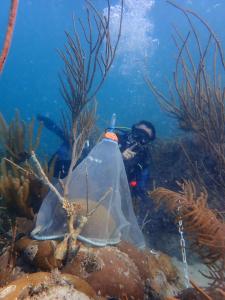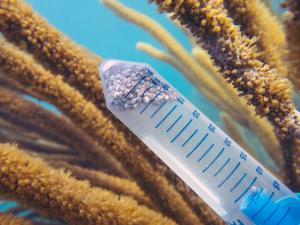The first observation of this species’ spawning will help researchers and restoration practitioners to better support its survival in the wild.
KEY LARGO, FLORIDA, USA, May 11, 2021 /EINPresswire.com/ -- Coral Restoration Foundation™, the University of Miami Rosenstiel School of Marine and Atmospheric Science (UM Rosenstiel School), and its Cooperative Institute for Marine and Atmospheric Studies (CIMAS), have made the first observation of grooved brain coral (Diploria labyrinthiformis) spawning from wild populations in Florida.Grooved brain corals have been observed to spawn elsewhere in the Caribbean from May through November, but no information yet exists for wild Florida colonies. The first observation of this species’ spawning will help researchers and restoration practitioners to better understand brain coral population dynamics and reproductive patterns in Florida, and to develop assisted spawning tools to better support this species.
Grooved brain coral, often abbreviated to D. lab, is abundant in a range of habitats from shallow inshore habitats to the outer deep reef tract. This iconic species can grow up to three meters in diameter. Although it is not listed as a threatened species, it has recently experienced major declines in Florida due to Stony Coral Tissue Loss Disease outbreaks. There are numerous rescued colonies of this species currently in captivity at the University of Miami Rosenstiel School and at the Florida Aquarium. These colonies were rescued from reefs throughout the Florida Keys due to threats from dredging in the Port of Miami and the disease outbreak, and have been observed spawning in captivity.
Today, wild D. lab colonies are so sparsely distributed on Florida’s Coral Reef that this species is unlikely to be able to successfully reproduce sexually in Florida’s waters. During this important spawning event, gametes were collected from 18 wild parent colonies and pooled together for batch fertilization. This method of pooling gametes from multiple individuals increases the chances of successful fertilization. Due to the large volume of gametes collected, approximately half were released back into the water before leaving the site. Allowing them to fertilize in containers at the surface is likely to result in greater numbers of larvae than would have been produced naturally and hopefully will result in better recruitment to the reef.
The remaining gametes were brought to land and excess sperm was cryopreserved by the UM Rosenstiel School for future use. Fertilized eggs and embryos are being reared in land-based seawater tanks systems at UM’s Aquaculture and Experimental Fish Hatchery by CIMAS NOAA SEFSC and UM Rosenstiel School for restoration and research purposes.
This work is partly funded by NOAA's Coral Reef Conservation Program and was all performed under research permits issued by John Pennekamp State Park (04222125K) and Florida Keys National Marine Sanctuary (FKNMS-2018-163-A1).
University of Miami Rosenstiel School of Marine and Atmospheric Science
About the University of Miami Rosenstiel School of Marine and Atmospheric Science
The University of Miami is one of the largest private research institutions in the southeastern United States. The University’s mission is to provide quality education, attract and retain outstanding students, support the faculty and their research, and build an endowment for University initiatives. Founded in the 1940’s, the Rosenstiel School of Marine & Atmospheric Science has grown into one of the world’s premier marine and atmospheric research institutions. Offering dynamic interdisciplinary academics, the Rosenstiel School is dedicated to helping communities to better understand the planet, participating in the establishment of environmental policies, and aiding in the improvement of society and quality of life. For more information, visit: www.rsmas.miami.edu
www.rsmas.miami.edu
Instagram: @umiamirsmas
Twitter: @UmiamiRSMAS
Facebook: @RosenstielSchool)
University of Miami Rosenstiel School’s Cooperative Institute for Marine and Atmospheric Studies
Since its founding in 1977, the Cooperative Institute for Marine and Atmospheric Studies, based at the University of Miami Rosenstiel School, has brought together research and educational resources of ten partner universities to increase scientific understanding of Earth’s oceans and atmosphere within the context of the National Oceanic and Atmospheric Administration’s (NOAA’s) mission. The institute provides research opportunities, educational training and outreach to students and post-doctoral scientists in NOAA-funded research.
https://cimas.rsmas.miami.edu/index.html
Instagram: @cimasrsmas
Coral Reef Futures Lab
Located at the University of Miami Rosenstiel School of Marine and Atmospheric Science, the Coral Reef Futures Lab studies the biology, ecology and conservation of coral reefs with a particular emphasis on the impacts of ongoing climate change on these ecosystems.
https://coralreeffutures.rsmas.miami.edu/index.html
Instagram: @coralreeffutures
Twitter: @coralreeffuture
Coral Restoration Foundation™
Coral Restoration Foundation™ (CRF™) is a non-profit marine conservation organization dedicated to restoring reefs to a healthy state in Florida and globally. Through large-scale cultivation, outplanting and monitoring of genetically diverse corals, CRF™ works to support the reefs’ natural recovery processes. CRF engages and empowers others in their mission with dive programs, educational activities, scientific collaborations, and community outreach. www.coralrestoration.org
Facebook: @coralrestorationfoundation
Instagram: @coralrestorationfoundation
LinkedIn: @coralrestorationfoundation
Twitter: @coralcrf
Alice Grainger
Coral Restoration Foundation
+1 415-770-8952
email us here
Visit us on social media:
Facebook
Twitter
LinkedIn
















